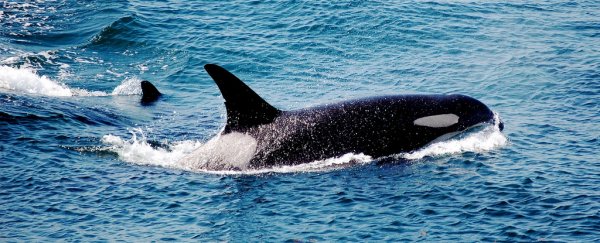They might not be writing books or producing off-Broadway plays, but orcas do actually have their own culture, just like us, and now researchers have found evidence that suggests this might have influenced their evolution.
Turns out, a number of orca cultures have evolved differently over the years, despite the fact that they all share a common ancestor, making them the first creatures - other than humans - to exhibit traits specifically based off the culture they experienced.
Before we get into the details, we have to first address exactly what a whale culture is.
For humans, we define culture as "The arts and other manifestations of human intellectual achievement regarded collectively." This generally means that we define human cultures by what they produce and what belief systems they uphold, but there's another factor that often gets overlooked: location.
It's safe to say that different cultures arise and flourish because they are, in some way, disconnected from other cultures, which is why our human cultures have started to blend more and more as the ability to communicate and travel across the world gets easier. In essence, humanity has started to erase the distance between cultures, allowing them to come together.
So what the heck does all this mean for orcas? Well, like much of human history, orca groups, referred to as niches, are separated geographically, which means there are separate orca niches in different areas around the world that never interact with one another.
All of these orca niches have, over time, developed their own cultures in the form of hunting and socialisation systems. For example, as Colin Barras explains for New Scientist, some orca groups hunt by corralling fish into giant balls for easy eating, while others feed on seal pups lying on beaches. Both of these groups are orcas, yet both have a distinct way of doing things.
This leads to the new study, which asked the question: do these unique groups have genetic differences derived from their different cultures?
To answer that question, researchers from the University of Bern in Switzerland examined genomes from 50 orcas spanning five niches - two from the Pacific Ocean and three from the Antarctic Ocean.
After their analysis, the team found that some genes do indeed differ from group to group, especially when it comes to diet. These findings suggest that killer whales, though connected by a common ancestor, have broken apart genetically, thanks to their cultural traits, reports Barras.
Though the team doesn't go into how these genes affect the diet of the orcas, it could work a lot like it did for humans.
For example, 90 to 100 percent of people with cultural roots in East Asia are lactose intolerant, meaning they lack the ability to properly digest lactose - a sugar found in milk. On the other hand, only 5 percent of people with Northern European descent have this issue, because Northern Europeans have a long history of drinking unfermented milk, while East Asians rarely, if ever, consume it. Over time, our bodies have changed accordingly.
The team says culturally charged genetic shifts occurred long ago, when small 'founding groups' of orcas invaded different ecosystems across the world. As their populations swelled, these groups gradually got better and better at finding food in these areas, passing on this knowledge through the generations to ensure the group's survival. After thousands of years, these cultural traits became ingrained in the orca's genetics.
"We suspect that the [invasion] event and subsequent bottleneck occur first and then the behavioural flexibility allows the founder group to adapt to local conditions," lead researcher Andrew Foote, from the University of Bern, told New Scientist.
It'll be interesting to see where the research will go from here, because the study seems to hint at another question: what other creatures are influenced by culture? For now, your guess is as good as ours.
The team's findings were published in Nature Communications.

